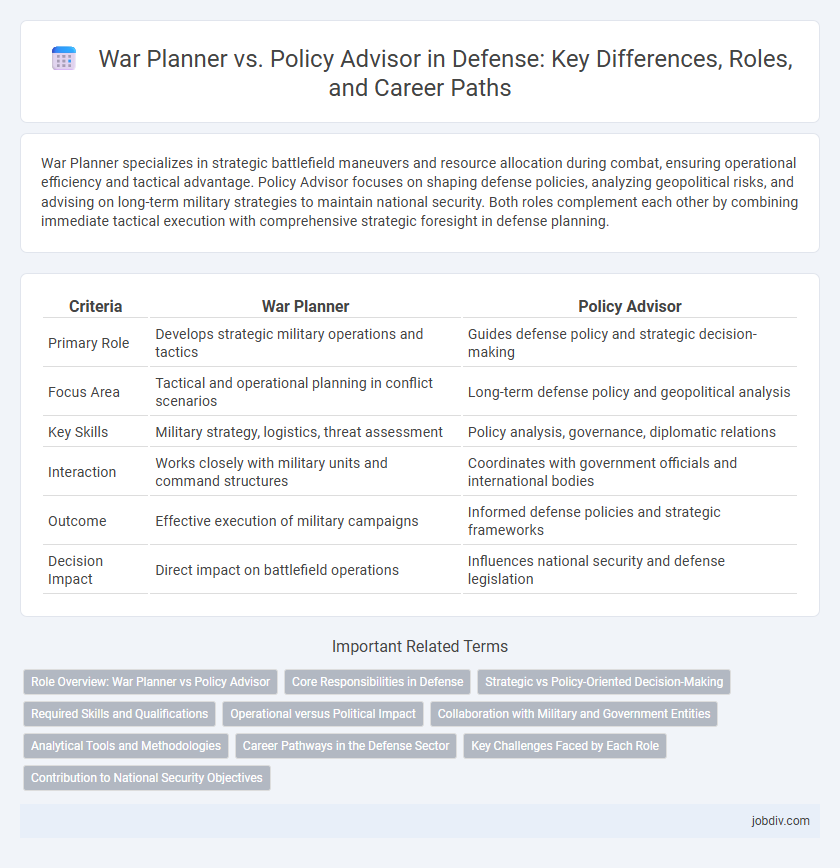War Planner specializes in strategic battlefield maneuvers and resource allocation during combat, ensuring operational efficiency and tactical advantage. Policy Advisor focuses on shaping defense policies, analyzing geopolitical risks, and advising on long-term military strategies to maintain national security. Both roles complement each other by combining immediate tactical execution with comprehensive strategic foresight in defense planning.
Table of Comparison
| Criteria | War Planner | Policy Advisor |
|---|---|---|
| Primary Role | Develops strategic military operations and tactics | Guides defense policy and strategic decision-making |
| Focus Area | Tactical and operational planning in conflict scenarios | Long-term defense policy and geopolitical analysis |
| Key Skills | Military strategy, logistics, threat assessment | Policy analysis, governance, diplomatic relations |
| Interaction | Works closely with military units and command structures | Coordinates with government officials and international bodies |
| Outcome | Effective execution of military campaigns | Informed defense policies and strategic frameworks |
| Decision Impact | Direct impact on battlefield operations | Influences national security and defense legislation |
Role Overview: War Planner vs Policy Advisor
War planners focus on developing tactical strategies and operational plans to achieve military objectives during conflict, leveraging intelligence, resources, and battlefield analysis. Policy advisors specialize in formulating defense policies, advising government leaders on geopolitical implications, legislative frameworks, and long-term security strategies. Both roles require deep expertise in military affairs but differ in scope; war planners emphasize execution and contingency planning, while policy advisors concentrate on strategic decision-making and diplomatic considerations.
Core Responsibilities in Defense
War Planners develop strategic military operations, analyze battlefield scenarios, and coordinate logistics to ensure optimal force deployment. Policy Advisors evaluate defense policies, provide recommendations on national security, and assess geopolitical risks to guide government decision-making. Both roles are critical for aligning military actions with overarching defense objectives and maintaining national security.
Strategic vs Policy-Oriented Decision-Making
War planners emphasize strategic decision-making by analyzing battlefield tactics, resource allocation, and enemy capabilities to develop comprehensive operational plans. Policy advisors focus on high-level policy-oriented decisions that shape defense initiatives, diplomatic relations, and military directives aligned with national security objectives. Both roles require deep expertise but differ in scope, with war planners targeting immediate military effectiveness and policy advisors guiding long-term defense strategy.
Required Skills and Qualifications
War Planners require strong analytical skills, expertise in military strategy, and proficiency in operational planning software to develop effective combat scenarios. Policy Advisors need in-depth knowledge of defense policies, excellent communication skills, and experience in government relations to shape strategic recommendations. Both roles demand advanced critical thinking, leadership abilities, and familiarity with national security frameworks.
Operational versus Political Impact
War planners focus on operational impact by developing detailed military strategies and tactics to achieve battlefield objectives efficiently. Policy advisors influence political impact by shaping defense policies that align military actions with national interests and diplomatic priorities. The synergy between operational planning and political guidance ensures cohesive execution of defense initiatives in complex geopolitical environments.
Collaboration with Military and Government Entities
War Planners coordinate closely with military units to develop strategic operations while ensuring alignment with defense capabilities and resources. Policy Advisors engage with government agencies to shape defense policies that support national security objectives and legislative frameworks. Effective collaboration between War Planners and Policy Advisors bridges the gap between tactical execution and strategic governance, enhancing defense readiness and interagency cooperation.
Analytical Tools and Methodologies
War Planners utilize advanced simulation software and scenario-based modeling to predict battlefield outcomes and optimize tactical decisions. Policy Advisors rely heavily on data analytics, statistical forecasting, and geopolitical risk assessment tools to shape strategic defense policies. Both roles integrate qualitative judgment with quantitative methodologies to enhance national security planning and operational effectiveness.
Career Pathways in the Defense Sector
War Planners typically advance through military education and strategic operations roles, emphasizing battlefield tactics and resource allocation, essential for high-stakes mission execution. Policy Advisors often follow a trajectory involving political science or international relations studies, coupled with experience in governmental or defense agencies, focusing on shaping defense policies and diplomatic strategies. Both career paths require strong analytical skills and an understanding of global security dynamics, but War Planners prioritize operational expertise while Policy Advisors concentrate on policy development and implementation.
Key Challenges Faced by Each Role
War planners confront challenges in integrating dynamic intelligence data with long-term strategic objectives, ensuring operational readiness amid evolving threats. Policy advisors grapple with balancing political considerations and military necessities while providing clear, actionable guidance to influence defense legislation. Both roles demand expertise in risk assessment, yet war planners prioritize tactical execution, whereas policy advisors focus on strategic policy formulation and stakeholder alignment.
Contribution to National Security Objectives
War planners directly contribute to national security by developing detailed operational strategies and contingency plans that enhance military readiness and response capabilities. Policy advisors influence national security objectives through the formulation and assessment of defense policies, ensuring alignment with broader strategic goals and diplomatic considerations. Together, their roles create a synergy that integrates tactical execution with strategic policymaking, optimizing defense effectiveness.
War Planner vs Policy Advisor Infographic

 jobdiv.com
jobdiv.com